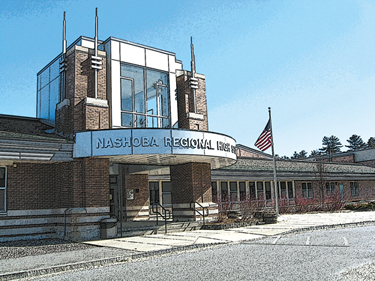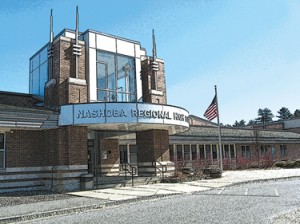
After a public hearing that drew few comments, the Nashoba School Committee officially approved its proposed budget last night, which comes in now at under $50 million. Meanwhile, some parents — especially in Stow — continue to question one of those spending items.
Though the initial budget proposal totaled more than $50 million (a 3.7% hike over this school year), the Committee managed to trim about $120,000 last night. Since its last meeting, the Committee has been studying Superintendent Wood’s three suggested tiers of cuts, from the least severe (Tier 1) to biggest impact (Tier 3).
The Committee accepted most of the first tier of cuts, calling for the district to, among other things, re-negotiate the bond on the Nashoba Regional High School track repair, subtracting an estimated $10,000 from the budget. However, at this tier, the Committee kept an anticipated $10,000 expense in new seating for the NRHS cafeteria, with Lancaster Rep. Cathy Thiel warning, “There are literally kids sitting on the floor in that cafeteria right now. It’s crazy.”
The Committee also kept $17,500 for Teaching & Learning’s curriculum planning, agreeing with Stow Rep. Jeff Odell that cutting it “is just too painful.” Committee Chair Nancy Federspiel of Bolton concurred, “We’ve been cutting that (Teaching & Learning) for years. That needs to stop. We have been cutting from the same places year after year.”
Another approved cut was the choice to lease a new district van rather than purchasing it, saving $30,000 over the original proposal.
The revised budget passed by six votes, with Stow Rep. Maureen Busch abstaining, and Stow Rep. Lynn Colletti voting against. In objecting, Colletti protested that the total of $165,000 the district plans to spend in launching full-day kindergarten across Nashoba “wasn’t even on the table.”
Still, Federspiel said, “If you look at per pupil spending, we are below the state average; we should not be.”
Wood said the district anticipates this number will be trimmed again by about $3.6 million in offsets (such as grants and state funding). Thanks in part to a peti-
tion drive by districts to the state legislature, he noted that the state likely will have its final estimates of aid to districts by late March, way ahead of the late spring deliveries of previous years.
The budget now must be approved by at least two of the three Nashoba towns at their Town Meetings, which all take place Monday, May 5.
Full-Day Kindergarten Debate Rolls On
For one budget item, it appears the debate may not be over.
Approved back on February 11 by a close margin, the Committee voted to fund converting all of Nashoba’s kindergartens into full-day classrooms come August. The Committee approved the move ahead of the budget, to give families time to plan for next year. Families would be charged $3,100 per child for the full-day program. Anyone wanting half days can send their children for the morning sessions only, at no cost.
Despite the tuition income, the administration estimated the plan set-up at a net cost of $165,000 for 2014/15, which is in the new budget. The long-range plan calls for converting all of Nashoba kindergartens into free, full-day sessions, though any funding needed beyond 2014/15 would be voted year to year.
Pointing to three pieces of correspondence the Committee received from Stow residents, asking for Nashoba to keep at least one kindergarten classroom exclu-
sively for half-day students, Lynn Colletti remarked, “They all [parents] don’t want the half day taken away.” Though Nashoba administration says it would like to convert all kindergartens to full day within three years, Colletti maintained, “We never agreed we’re getting rid of half day kindergarten totally. We haven’t agreed to [exclusively full day], we don’t know how to fund it.”
Cathy Thiel pointed to a letter from Michael Wood to families of all incoming kindergarten students, saying it was misleading about the plan’s future. According to Thiel, the letter stated that Nashoba plans to phase out one-third of the kindergarten tuition cost each each year, until all students are in full day. While that is the plan, Federspiel declared, “We didn’t vote on anything beyond this year.”
Maureen Busch reflected that full-day kindergarten may be inevitable, at least in Massachusetts. “It is going that way. Pretty much everyone west of us offers it, and everyone within 495 doesn’t offer it, or charges for it.”
Wood stated that the district plans an information night on its kindergarten plans before April vacation.
In another piece of correspondence, Cathy Thiel explained that one parent of an eighth-grader expressed concern over spring parent/teacher conferences taking place in April, after the students have selected their high school courses. These conferences used to be scheduled for March, allowing teachers to offer advice on course choices, she pointed out. Thiel said, “Parents of eighth-graders are going in to the high school blind, and I’m one of them.” The Committee noted it would put the topic on a meeting agenda before the end of the school year.
